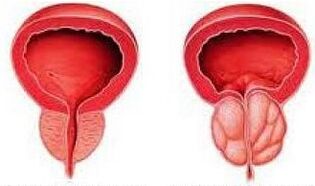Chronic prostatitis is a long -term inflammation of the prostate gland, while symptoms are usually absent, which is why most of the male population is not aware of the disease.

Development in a chronic form of prostatitis is a consequence of an acute process, although in practice it is quite rare.As a rule, inflammatory chronic prostatitis begins gradually, without symptoms and unpleasant sensations, usually the course of the disease is found in the patient by accident, when examining an ultrasound.
Young men and middle people and elderly are subject to chronic form.Prostatitis also threatens those who lead an inactive lifestyle by the family of their activities, feels excessive groin physical effort and observes sexual abstinence.
Classification
According to the modern classification of prostatitis, developed in 1995, various categories of the disease are distinguished:
- OBP Prostatitis (OBP) is the most common type of prostatitis.It is usually caused by a bacterial infection and is easily diagnosed due to typical signs.Acute bacterial prostatitis may occur at any age.Symptoms include painful urination, inability to completely empty the bladder, lower abdomen pain, back or pelvic area.There may be a fever accompanied by chills.
- Chronic bacterial prostatitis is a disease with typical symptoms of chronic inflammation and an increased amount of bacteria and leukocytes in urine and prostate secret after its massage.
- Chronic prostatitis (PC) is the most common form of prostatitis.In most cases, it is a consequence of acute bacterial prostatitis (untreated or mispinted).If there are symptoms, they occur in the form of pain in the genitals or pelvic organs, difficulties during painful urination or urination and ejaculation.
- Asymptomatic inflammatory prostatitis - with this form of disease, classic prostatitis symptoms are absent and the disease itself is detected by chance, when contacting the clinic for a different reason.bacterial chronic (infectious) prostatitis;In the absence of microbial pathogens -non -bacterial (non -infectious) prostatitis.It is believed that in 90-95% of all cases, non-bacterial chronic prostatitis occurs and only 10-5% -Bacterial.

Na presença de um componente infeccioso, eles indicam uma prostatite crônica bacteriana (infecciosa); Na ausência de patógenos microbianos -sobre prostatite não bacteriana (não infecciosa). Acredita-se que em 90-95% de todos os casos, a prostatite crônica não bacteriana ocorra e apenas em 10-5%-bacteriano.
Reasons
The occurrence of chronic prostatitis can contribute to several factors.First of all, this is:
- IPP: chlamydia, ureaplasma, mycoplasm, herpes viruses, cytomegalovirus, trichomonados, gonococcus, genu ado, E. coli (Escherichia coli) can affect urethra and detect prostate in tissues;inflammation);
- sedentary lifestyle (drivers, office staff, employees);
- Prolonged sexual abstinence interrupted by sexual intercourse or sexual stretching of sexual intercourse;
- regular hypothermia (lovers of extreme relaxation: diving, surfing and skiing); stress: mental and physical overload.It is important as the condition of pelvis and blood circulation in them, the presence of concomitant diseases and the level of protection mechanisms.
- Symptoms of chronic prostatitis
- Most of the time, with the development of a chronic form of prostatitis, symptoms virtually without disturbing a man.In this case, all signs of acute prostatitis do not manifest or show to a much smaller degree.
The most common symptoms of chronic prostatitis in men are: periodic pain and unpleasant sensations in the perineum;
Unpleasant sensations in defecation and urination;
Irradiation in the anus, thigh, testicles;Being so insignificant that patients with chronic prostatitis do not pay much attention to them.
Exacerbation of chronic prostatitis
- The exacerbation of the disease, as a rule, follows the following symptoms:
- Pain and burning in the urethra;
- Frequent impulse to the urinary process;
- Descargas da uretra.
Mudanças na imagem do curso da doença, já não são muito brilhantes, podem ser tão insignificantes que pacientes com prostatite crônica não prestam muita atenção a eles.
Exacerbação da prostatite crônica
A exacerbação da doença, em regra, acompanha os seguintes sintomas:
- dor e queima na uretra;
- impulso frequente ao processo urinário;
- Lower, perineum and rectum pain; Signs of decrease in men of sexual activity;
- pain during defecation.
- According to some doctors, psychological symptoms of chronic prostatitis can also be distinguished, including greater irritability, anxiety, fatigue, temperament, sleep disturbance, obsession and depression.2-3 signs of the disease.For example, the most common is an impaired erection and pain in the lower abdomen.

Why can prostatitis cause infertility?
The fact is that the prostate gland produces a special secret that ensures sperm viability.With inflammation, the prostate secretary function worsens, which inevitably affects the quality of sperm.
In addition, the prostate gland is actively involved in regulating testosterone production and erection process.This is why chronic prostatitis causes a decrease in erectile function to impotence.However, these scenarios for the development of the disease can be avoided by performing timely and competent treatment.
Diagnosis
The following procedures are necessary to help establish/refute diagnosis:
Retal study;
Prostate secrecy microscopy;Endoscopic and Urodynamic are performed additionally.
- How to treat chronic prostatitis
- If a man has chronic prostatitis, treatment is always long and difficult.Its duration depends directly on the stage of the disease at which the patient turned to a specialist.Therapy involves an integrated approach, that is, a combination of various methods simultaneously:
- Antibacterial therapy;
- Prostate massage;
- Physiotherapeutic procedures;
Dietary correction and lifestyle;
The use of popular remedies;
Se um homem tem prostatite crônica, o tratamento é sempre longo e difícil. Sua duração depende diretamente do estágio da doença em que o paciente se voltou para um especialista. A terapia envolve uma abordagem integrada, ou seja, uma combinação de vários métodos simultaneamente:
- terapia antibacteriana;
- massagem da próstata;
- procedimentos fisioterapêuticos;
- correção da dieta e estilo de vida;
- o uso de remédios populares;
- Tratamento cirúrgico.
In addition, anti -inflammatory and antispasmodic agents are used to treat the chronic form of the disease.
Drug treatment
The choice of medicines depends on the cause and symptoms of the disease.To cure chronic prostatitis of infectious etiology, antibacterial medications are used:
- fluoroquinolones;
- Macrolides;
- tetracyclines.

To eliminate inflammatory phenomena and pain syndrome, non -hormal painkills and anti -inflammatories are used in recent years, the treatment of chronic prostatitis is occurring using drugs previously previously using medicines that previously that previously that previously thatThey are not used for this purpose: alpha1 blockers, 5 red inhibitors, cytokine inhibitors, immunosuppressants, medications that affect the change of urats and citrate.
Physiotherapy
Certain physiotherapeutic procedures such as laser therapy, electrophoresis, microwave hyperthermia, ultrasonic phonophorem and others also help to improve trophic tissues from the prostate and accelerate cure tissue.Prostate
Improves drainage of prostate secret and microcirculation at the level of this organ, which in turn contributes to the patient's rapid recovery.
Prostate massage cannot be performed with acute prostatitis, hemorrhoids, rectum cracks.Prostate massage is usually combined with antibiotic therapy.Numerous clinical studies have shown the high effectiveness of this treatment.
Operation
Surgical intervention is possible to remove prostate areas affected by bacteria.Transureral resection is an operation performed under epidural or intravenous barbiturre anesthesia.The post -operative recovery period lasts no more than a week.
Methods involving the treatment of chronic prostatitis are determined by the urologist based on diagnostic information and his practical experience.Performing independent home therapy based on criticism on the internet is full of consequences.
Operação
A intervenção cirúrgica é possível para remover áreas de próstata afetadas por bactérias. A ressecção transuretral é uma operação realizada sob anestesia de barbiturres epidurais ou intravenosas. O período de recuperação pós -operatório dura não mais de uma semana.
Os métodos que envolvem o tratamento da prostatite crônica são determinados pelo urologista com base em informações de diagnóstico e sua experiência prática. Realizar terapia independente em casa com base em críticas na Internet está repleta de consequências.































